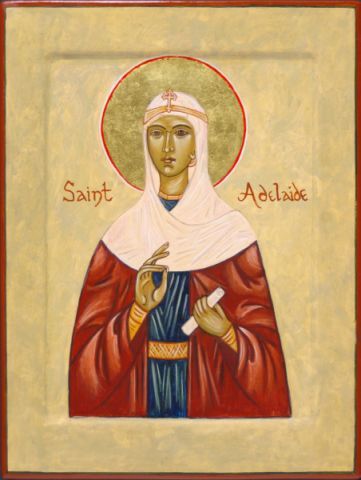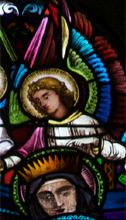Today, June 15, we celebrate the feast of Saint Aleydis of Schaerbeck (also known as Saint Alice, Alice the Leper, and Saint Adelaide, 1204-1250), Patron Saint of the Blind and Paralyzed. Saint Aleydis is a perfect example of Christian suffering, devotion, and humility. She was sustained by her love of the Lord and her reception of the Holy Eucharist.
Born at Schaerbeek (near Brussels) Belgium, Aleydis was raised in a pious household. Ill and frail as a child, she took to spending her days in devotion and prayer, and at the young age of 7, requested that she be raised at the Cistercian convent of “Camera Sanctae Marie,” the Chamber of Saint Mary. There, the nuns of the convent raised her in the ways of devotion and prayer, educating her both spiritually and intellectually.
From her arrival, Aleydis impressed her sisters with grace and humility. As she matured, she requested and was granted entrance into the Order. The quiet contemplation of the convent was a good match to her shy personality, although she took every opportunity to serve her sisters, performing the most menial and despised tasks. She was admired, in return, for her piety and devotion, and miracles were recorded at her prayerful intercession.
As a young woman, Aleydis contracted leprosy, and was forced into quarantine in the convent. It grieved both her and her sisters to be isolated from each other. For Aleydis, leprosy was but the beginning of her sufferings. It brought in its wake other sufferings, sufferings of the heart, of the mind, and of the soul. It brought, more than anything else, a great loneliness. Her biographer says that the first night of her reclusion “her heart was so severely crushed and bruised, that her spirit fainted away, and her mind remained forcibly in shock.”
But in her own suffering, Aleydis soon found in her solitude the opportunity to more fully contemplate the sufferings of Christ. As her illness progressed, she was stricken with blindness and paralysis, but took these as signs of her growing closer to the Lord, sharing His suffering, and prayed for continued opportunities to suffer for sinners and the world.
One day another nun, Dame Ida, seeing the extent of Alice’s sufferings, began to weep. Alice, disfigured and handicapped, consoled her, saying: “Sweetest Sister! Be not so afflicted! Do not imagine that is for sins of my own that I am prey to these torments. Rather, it is for the deceased, subject to long, excruciating detention in purgatory, and for the sinners of the world, already miserably trapped in the fowlers’ snares and apt to be endlessly seduced. Yes, while this penalty, as you see, is rapidly consuming me, it is also having the happy effect of releasing the living, and of freeing the deceased from all such snares.”
While she was nourished each day by Eucharist, Saint Aleydis reported her truest suffering to be her inability to receive from the chalice during Communion. Soon after, our Lord appeared to Alice and consoled her by stating that receiving the consecrated bread was receiving the Blood as well as the Body of Jesus. He stated, "Where there is part, there also is the whole."
At the age of 45, Aleydis became gravely ill and received the anointing of the sick. It was revealed to her in an ecstatic vision that she would suffer for twelve more months on earth, but would also be graced with ecstasies and revelations. She spent the remainder of her days in physical agony, praying for the souls in purgatory. On June 10, 1250, as predicted, Saint Aleydis died. She is recognized as the patroness of those suffering from paralysis.
Saint Aleydis’ prayers and sacrifices for sinners were perfectly in keeping with the doctrine of sharing that the Church has always taught, between the faithful on earth, in heaven and in purgatory. This is the Communion of Saints. Like Saint Aleydis, we must try to turn our suffering into good and pray in communion with the Saints that God will give us the strength to endure and that we may be consoled through the reception of the Sacraments and the prayers of the faithful.
Year 2: Day 166 of 365
Prayer Intentions: Joy in our suffering.
Requested Intentions: Restoration of health (D); Successful employment for couple (N); For employment for children (K); For health of friend, for successful relationships for children, for safe pregnancy for daughter (C); For the health of a mother (J); Virtue for daughter (V); Successful acceptance to college for nephew (M); For the health of a cousin (T); Freedom from legal difficulties for husband (S); Husband’s freedom from illness (L); Personal intentions (S); Successful passing of dental board examination (P); Blessings on a family (Z); Successful permanent employment (C); Healing of a son with autism (J); Son’s successful employment (L); For the intentions of family and relatives, for the Carthusian community (T); For personal intentions (A); Restoration of lost hearing (C); Resolution of relational and financial challenges (S); Comfort following loss of husband, security for family, assistance with housing (B); Healing and return of brother (O); Successful hermitage foundation (S); Support from family, permission to marry (H); Recovery of wife following surgery, freedom from depression (W); Protection and recovery of mentally ill daughter (J); Successful resolution to legal proceedings (N); Freedom from worry and successful employment (M); For successful sale of home and freedom from debt (J); Freedom from pain and illness (E).
Why pray the Rosary every day for a year?
Each time the Blessed Virgin has appeared-- whether it be to Saint Bernadette Soubirous at Lourdes; to Lucia, Jacinta, and Francisco at Fatima; or to Mariette Beco at Banneux-- she has asserted the importance, saving grace, and power of praying the Holy Rosary on a daily basis. Based upon her words, the Rosary is penance and conversion for sinners, a pathway to peace, an end to war, and a powerful act of faith in Jesus Christ. Pope Paul VI presented the Rosary as a powerful means to reach Christ "not merely with Mary but indeed, insofar as this is possible to us, in the same way as Mary, who is certainly the one who thought about Him more than anyone else has ever done."
To show us how this is done, perhaps no one has been more eloquent than the great Cardinal Newman, who wrote: "The great power of the Rosary consists in the fact that it translates the Creed into Prayer. Of course, the Creed is already in a certain sense a prayer and a great act of homage towards God, but the Rosary brings us to meditate again on the great truth of His life and death, and brings this truth close to our hearts. Even Christians, although they know God, usually fear rather than love Him. The strength of the Rosary lies in the particular manner in which it considers these mysteries, since all our thinking about Christ is intertwined with the thought of His Mother, in the relations between Mother and Son; the Holy Family is presented to us, the home in which God lived His infinite love."
As Mary said at Fatima, "Jesus wants to use you to make Me known and loved. He wishes to establish the devotion to My Immaculate Heart throughout the world. I promise salvation to whoever embraces it; these souls will be dear to God, like flowers put by Me to adorn his throne."

Subscribe to:
Post Comments (Atom)











0 comments:
Post a Comment
Thanks for leaving a comment. If you wish to submit a prayer request, however, please do so above, using the "Contact" tab.